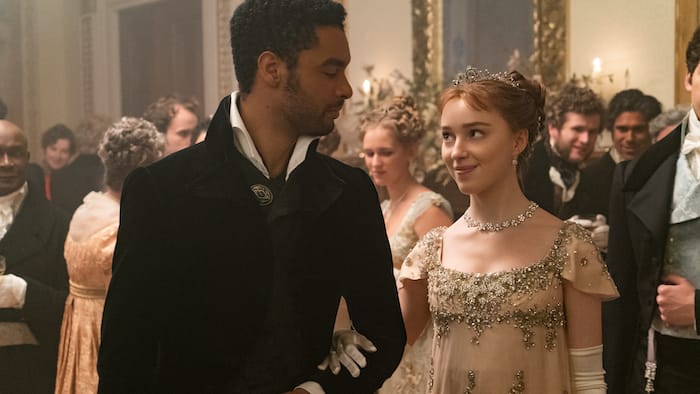UCL law student Sara López-Viejo examines the portrayal of non-consensual sex in the Netflix smash hit

Netflix’s Bridgerton has quickly achieved international recognition, among people of all ages and backgrounds.
The eight episode series is set in Britain’s regency era, following our heroine Daphne Bridgerton and her family through London’s social season. As we get an insight into the elites, with their fancy gowns and cutting remarks, the series promises a fantasy world where all races are equal, where men respect women’s choices and women feel empowered to decide their own path. However, not all that glistens is gold, as the audience gets to see when a non-consensual sex scene is presented as acceptable between the two main characters.
The scene I’m referring to is at the end of episode six, shortly after Daphne and Simon were married. Simon told Daphne that he could not have children, but she begins to suspect this is a lie, and so decides to concoct a scheme to find out for herself. She initiates foreplay with her husband and once he gets carried away, she gets on top of him and holds him down. When he realises what she is trying to do, he calls her name desperately three times, and asks her to ‘wait’, TWICE. Alas, she continues regardless, forcing him to finish inside her, and becoming pregnant as a result. When they both realise what has happened, Daphne accuses him of lying, tricking and humiliating her, while he is still trying to come to terms with the fact that his wife had forced him into a sexual act he did not want, and hence, had not consented to.
My issue with this scene is how it might influence the actions of an unknowing viewer, especially the younger generation, which is why I want to approach this with 21st century law. In the English and Welsh jurisdictions, the Sexual Offences Act 2003 in its section 1 lists the requirements for the crime of rape to have taken place, essentially being penetration by A and the lack of consent from B. I’ll review the point on consent, which will illuminate the rest.
For there to be rape, B must not have consented to the penetration. Section 74 provides a definition for legitimate consent: ‘a person consents if he agrees by choice, has the freedom to make that choice and has the capacity to make that choice’. All three are required for consent to be valid, but the critical one here is ‘agreement by choice’. Simon had consented to penetration without ejaculation, thus when Daphne forces sex with ejaculation, Simon could not ‘agree by choice’.
The High Court of England and Wales addresses this issue in a similar case (R(F) v DPP), where a woman was adamant that she did not want another child, and yet her husband forced her to have sex with ejaculation giving the reasoning that ‘you are my wife and I’ll do it if I want’. As a result, she became pregnant. The High Court concluded that she was deprived of choice relating to the crucial feature on which her original consent was based and hence ‘her consent was negated’. ‘In law, this combination of circumstances falls within the statutory definition of rape’.
Want to write for the Legal Cheek Journal?
Find out moreSimilarly, in the extradition case of Assange this sentiment was reiterated, with the High Court concluding that ‘his conduct in having sexual intercourse without a condom in circumstances where she had made clear she would only have sexual intercourse if he used a condom would therefore amount to an offence under the Sexual Offences Act 2003’.
The reason why most of the audience did not realise how Simon’s consent was negated is because the viewer is made to empathise with Daphne, as she has been betrayed by her husband when he misinformed her he could not have children. However, the end does not justify the means. Instead of just asking, Daphne decides to violate her husband’s freedom of choice and do something he would never have consented to in the first place. This is incredibly problematic, as millions of viewers might get the notion that violating someone’s freedom of choice is acceptable. That forcing a sexual act is okay. That marriage or being in a relationship gives you licence to do as you please.
It is NOT, for several reasons. Firstly, each person must have the right to decide what to do with their body, under the principle of autonomy. It is a basic human right that we must be able to choose, regardless of our circumstances. For example, just because Daphne and Simon are married does not mean they have a right to violate the other’s freedom of autonomy. Although in the past rape was not contemplated in the confines of marriage, this is the 21st century and we are now far from that.
Furthermore, it is not okay to violate someone’s freedom of choice because of the consequences it might bring, such as pregnancy or sexual disease. I am sure any person reading this article could agree that they would not like to see their life paralysed by the unexpected arrival of a child as a result of their partner not caring about their priorities. Man, woman or other, it is just not right.
Lastly on the issue of consent, the Sexual Offences Act 2003 recognises another instance where consent does not exist in section 76: there will not be consent where B intentionally deceives A as to the nature or purpose of the act. This alludes to the idea of transparency, deeming it necessary for both parties to understand the nature and purpose of the act they are engaging in. In the alluded to scene, there is a misalignment of purposes: Simon seeks sexual gratification, while Daphne seeks to verify her suspicions. She uses him, without his knowledge for a different purpose. This is another reason why consent does not exist in this scene.
Having dealt with consent, I want to discuss the first requirement of rape, penetration. Section 1 of the Act specifically alludes to a ‘he’, making it clear that only a man can be convicted of rape, because only he can penetrate. I would like to argue that restricting the offence to just the male sex is senseless. There is a clear parallel between Daphne and Simon’s sex scene and the R(F) v DPP case discussed above, where the woman consented to sex without ejaculation and her husband violated that wish, as the only difference between them is the sex of the perpetrator and of the victim. Both women and men are capable of forcing a sexual situation, which is why it makes no sense to criminalise the act on the basis of sex. I do not think section 1 should call for a ‘he intentionally penetrates’ but rather just ‘intentional penetration’. Therefore, in whichever instance where penetration happens, regardless of whose intention it is, that would be rape.
Bridgerton was generally a joy to watch, and the creators have taken an admirable first step towards portraying equality among people, regardless of sex or race. Other than a few exceptions, male characters are shown to be respectful of women, and women are shown to be empowered. However, there is so much more work to be done. The scene I have described in this article cannot go unnoticed, and it is imperative that the general public is not influenced by the characters’ acts. As we have seen, Daphne forces a non-consensual sexual act to confirm a suspicion she had about her husband lying to her. I am yet to understand why a rational person would incur in sexual assault to verify a suspicion instead of simple healthy communication. I am not a relationship expert, but assault is never the answer, and consent is always the priority.
Sara López-Viejo is a third year law with Hispanic law student at UCL.



